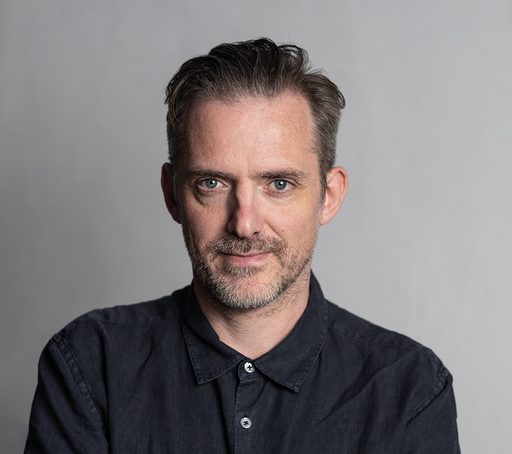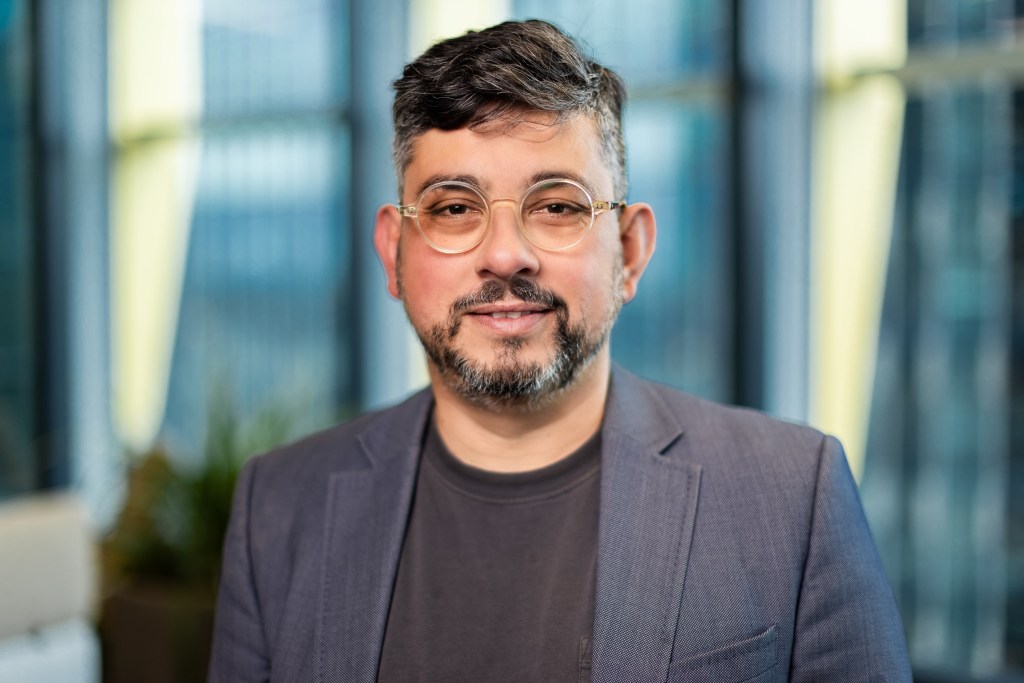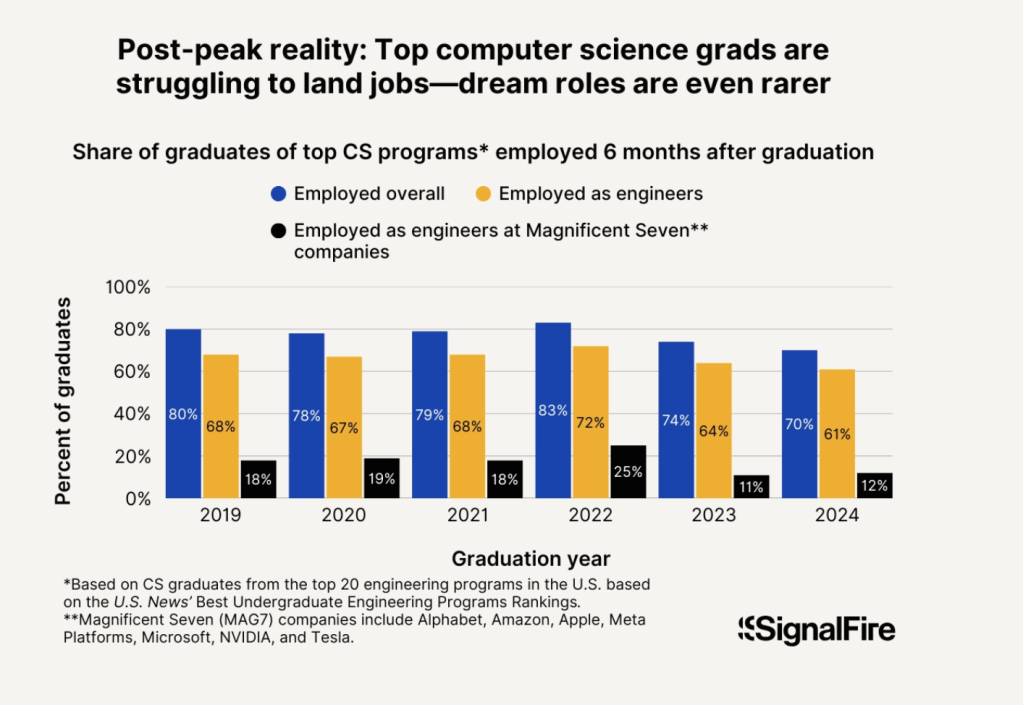Gaining and refining skills any way you can get them is the new path forward, say tech insiders.

On a summery 25-degree day in June, Ford CEO Jim Farley stepped into a crowded room in Colorado’s preeminent ski town and said out loud what vast swaths of the global workforce have been thinking.
“AI is going to replace literally half of all white-collar workers,” Farley told the Aspen Ideas Festival audience.
The automotive CEO’s sombre speech has since made headlines around the world, but he is not alone in making declarative statements about the impending dismantling of well-trodden career pathways toward upward mobility.
“We’ve been hearing from young people all over the world about how tough it is to land that first job and how AI is changing the nature of work and career building faster than a lot of folks expected.”
Aneesh Raman, LinkedIn’s Chief Economic Opportunity Officer
Dario Amodei, the former OpenAI executive and founder of AI heavyweight Anthropic, also posited in recent months that is likely that new-graduate job decline will go far beyond the tech sector.
“AI could wipe out half of all entry-level white-collar jobs — and spike unemployment to 10-20% in the next one to five years,” Amodei told news outlet Axios in May. ” I don’t think this is on people’s radar. We, as the producers of this technology, have a duty and an obligation to be honest about what is coming.”
Statements like that are pushing companies all over the world, Australia included, to reevaluate how the next generation of workers can be trained and progress in their careers.

“Entry-level jobs are under threat,” says Chris Smith, the head of strategy and innovation at Australian-founded software company ReadyTech.
“AI is set to reshape the talent landscape. While much of the discourse often centres on disruption, the more urgent challenge in our view is the collapse of early-career opportunities, the foundational roles that enable workers to gain experience, learn on the job, and progress.”
ASX-listed, Sydney-headquartered ReadyTech was founded by British entrepreneur Marc Washbourne in 1999. The firm recently joined NSW’s Skills Pledge, providing solutions to facilitate 20 per cent of Australian digital entry-level hires coming through alternative pathways. It is a ‘skills first’ approach that can be delivered through universities, TAFE, or other avenues.
“We’re taking an employment-first approach, prioritising upward career mobility for those already in entry-level roles such as customer support. This creates natural openings for new talent to enter low-skilled roles with fewer barriers, allowing us to recruit for potential, not pedigree,” says Smith.
“Once inside, we focus on developing mastery, defining clear technical pathways, and repeating the cycle. It’s a scalable, human-centred solution to a rapidly shifting labour market.”

It is a fix that is endorsed by the very top of the tech pyramid.
“Alternative pathways, such as vocational training, vendor courses, and earn-while-you-learn models, play a vital role in building our tech workforce pipeline,” says Damian Kassabgi, CEO of the Tech Council of Australia.
“We believe the Pledge will play a significant role in the development of innovation and growth in our sector, helping to secure Australia’s digital future.”
The entry-level jobcopalypse
In January, Seattle-headquartered tech company Microsoft made its first round of 2025 job cuts, culling 2,000 employees. Four months later, 8,000 had been laid off. This week, publicly traded Microsoft – valued at almost AUD$5.7 trillion today – is said to be chopping another 9,000 jobs, some 4 per cent of its total workforce.
It has been reported that 120 of the July lay-offs are Australian-based, though Microsoft won’t confirm that number. Instead, the company says it is “implementing organisational changes to best position the company for success in a dynamic marketplace,” according to a statement given to Forbes Australia.

While all eyes are on the Microsoft employees heading out the door, equally concerning is the decline in the number of entry-level graduates entering tech company offices for the first time.
”As budgets tighten and AI capabilities increase, companies are reducing their investment in new grad opportunities,” says Asher Bantock, the head of research at San Francisco venture capital firm SignalFire.
Bantock calls the halving of entry-level recruitment in recent years a ‘hiring drought.’ SignalFire’s 2025 State of Tech Talent report found that graduate hiring slowed 25 per cent in 2024. and has declined 50 per cent since 2019. The cause of the drought is AI, the research reveals.
“As AI tools take over more routine, entry-level tasks, companies are prioritising roles that deliver high-leverage technical output,” the Tech Talent report reads.
“Big Tech is doubling down on machine learning and data engineering, while non-technical functions like recruiting, product, and sales keep shrinking – making it especially tough for Gen Z and early-career talent to break in.”

Recruitment is particularly dire at tech’s ‘magnificent seven’ firms – Alphabet, Amazon, Apple, Meta, Microsoft, NVIDIA and Tesla, according to the research. That predominantly impacts hiring near the headquarters of these companies – ie, in the US – though the impact is starting to be felt in other countries, too.
Breaking – and fixing – the bottom rung of the career ladder
Diversifying the tech talent pipeline is a priority at Microsoft’s local operation, too.
“The 20% Alternative Pathways Pledge offers a significant opportunity for us to collectively strengthen the digital workforce while promoting diversity and inclusion,” says Steven Worrall, the CEO of Microsoft ANZ and the Chair of the NSW Skills Board.
Microsoft ANZ signed on to the pledge in 2024, prioritising ‘traineeships’ to get more Australians into the tech company doors and facilitate the Australian government’s objective to fill 1.2 million tech job within five years.

“This commitment is a unique opportunity to set the standard for inclusive hiring practices, showing leadership across the private and public sectors,” says Worrall, who will step down from Microsoft’s CEO role at the end of August 2025.
Top brass at LinkedIn, another Microsoft entity, is also showing concern over the decline of entry-level tech opportunities.
“We’ve been hearing from young people all over the world about how tough it is to land that first job and how AI is changing the nature of work and career building faster than a lot of folks expected,” LinkedIn’s Chief Economic Opportunity Officer Aneesh Raman said recently.
Raman wrote an op-ed in the New York Times in May stating that the bottom rung of the career ladder is breaking.
“There are growing signs that artificial intelligence poses a real threat to a substantial number of the jobs that normally serve as the first step for each new generation of young workers,” Raman said in the article.
And that is what ReadyTech and other Australian tech executives are working to find answers for.
“AI doesn’t have to mean the death of the first job,” says Smith. “But it does force us to rethink how we create, protect and evolve entry-level roles.”
Look back on the week that was with hand-picked articles from Australia and around the world. Sign up to the Forbes Australia newsletter here or become a member here.


